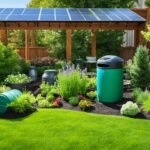
Did you know that effective lawn maintenance is crucial for not just the appearance of your home, but also for improving air quality and promoting a healthy environment? According to a recent study, proper lawn care, including tasks like irrigation, mowing, feeding, aeration, and weed control, can significantly enhance the overall health and sustainability of your turf.
When it comes to maintaining your lawn, it’s important to consider not only the traditional methods but also the alternatives that can minimize the negative impact on the environment. By making conscious choices in ground care services, you can contribute to a greener future and enjoy a beautiful and sustainable outdoor space.
Key Takeaways:
- Proper lawn maintenance includes irrigation, mowing, feeding, aeration, and weed control.
- Traditional lawn care methods, such as gas-powered equipment and synthetic fertilizers, have a significant environmental impact.
- Transitioning to sustainable practices like electric lawn equipment, organic fertilizers, and native plants can minimize environmental harm.
- Sustainable lawn care practices enhance biodiversity, improve air quality, and contribute to a greener future.
- Consulting local landscaping professionals can provide expertise and guidance on sustainable ground care services.
The Environmental Impact of Traditional Lawn Care Methods
Traditional lawn care methods have a significant environmental impact, as highlighted in the second source. The use of gas-powered lawn equipment and synthetic fertilizers contributes to various environmental hazards, including air pollution, water pollution, and increased carbon footprint.
Gas-powered lawn equipment, such as mowers and leaf blowers, emit harmful pollutants into the air. These emissions, including volatile organic compounds (VOCs), pose risks to both human health and the environment. In fact, millions of tons of pollutants are released each year by gas-powered lawn equipment, contributing to poor air quality.
Synthetic fertilizers, commonly used in lawn care, also pose significant environmental risks. The manufacturing and use of synthetic fertilizers contribute to climate change and water pollution. Nitrogen-based fertilizers, in particular, release nitrous oxide, a potent greenhouse gas, and can contaminate water bodies through runoff, leading to eutrophication and the formation of “dead zones”.
It is crucial to address these environmental hazards associated with traditional lawn care methods. By adopting more sustainable and eco-friendly practices, we can reduce lawn pollution and minimize our carbon footprint.
Alternative Lawn Care Practices
- Switch to Electric Equipment: Replace gas-powered lawn equipment with electric alternatives. Electric mowers and leaf blowers are not only quieter but also generate zero emissions, reducing air pollution and improving air quality.
- Choose Organic Fertilizers: Opt for organic fertilizers instead of synthetic ones. Organic fertilizers are derived from natural sources and promote soil health while minimizing the release of greenhouse gases.
- Promote Native Plants: Embrace native plants in your lawn, as they are well-adapted to the local environment and require less maintenance. Native plants also support biodiversity and provide habitats for local wildlife.
Benefits of Sustainable Lawn Care
By transitioning to sustainable lawn care practices, we can achieve multiple benefits for both the environment and our communities:
- Reduced Air Pollution: Electric lawn equipment eliminates emissions, leading to cleaner air and a healthier environment for all.
- Improved Water Quality: Organic fertilizers minimize the risk of water pollution, protecting our water bodies from harmful nutrient runoff.
- Enhanced Biodiversity: Incorporating native plants and diverse landscaping elements promotes biodiversity, supporting local ecosystems and wildlife.
- Lower Carbon Footprint: Sustainable lawn care practices help reduce the overall carbon footprint, contributing to mitigating climate change.
Together, through the adoption of these eco-friendly practices, we can make a positive impact on the environment and create a greener future for our lawns and communities.
Sustainable Lawn Care Practices for a Greener Future
Transitioning to sustainable lawn care practices can help minimize the negative environmental impact and create a greener future. One alternative highlighted in the second source is the use of electric lawn equipment, which eliminates harmful emissions and reduces air pollution. Electric mowers and leaf blowers are becoming more affordable and efficient, making them a viable option for homeowners.
Another sustainable practice is the use of organic fertilizers, which have lower carbon footprints compared to synthetic ones. By choosing organic fertilizers and allowing lawn clippings to decompose on the lawn, homeowners can promote soil health and reduce the release of greenhouse gases.
Additionally, embracing native plants and diverse landscaping elements, as suggested in the third source, can enhance biodiversity, improve soil quality, and provide habitats for endangered species. Incorporating shrubs and trees in the landscape can also enhance carbon capturing abilities and help combat climate change. Overall, adopting these sustainable lawn care practices can contribute to a healthier and more environmentally friendly outdoor space.






No comment yet, add your voice below!